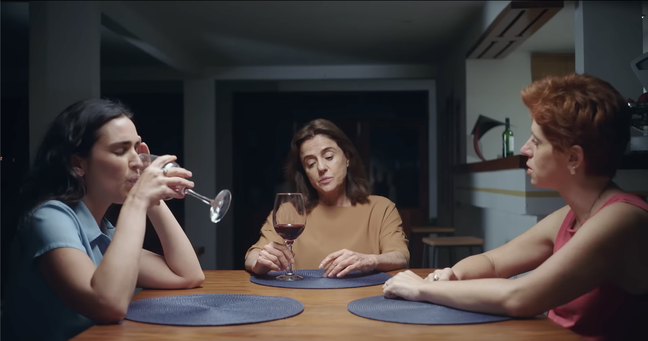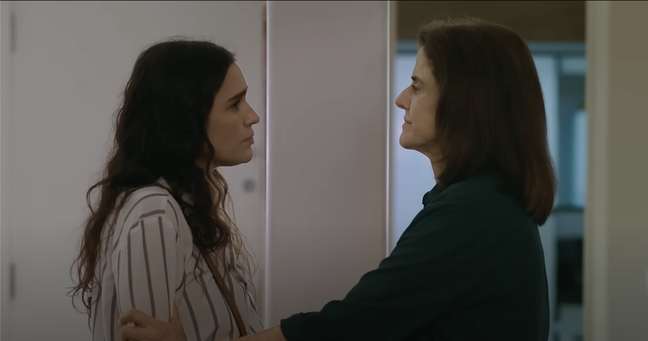The actress stars in the film “Aos Nosso Filhos”, which saves the story of a woman who was the victim of torturers during the military dictatorship in Brazil

In one of the most symbolic scenes of ‘To Our Children‘, a film by Maria de Medeiros which opens on the 28th, Vera groans in labor, surrounded by cockroaches in a cell in the basement of the Dictatorship. The sequence of one of the protagonists of the feature film is more than a nightmare deriving from the trauma experienced by the character of Marieta Severo. It is a faithful representation of one of the many crimes committed by the military regime in Brazil, which lasted from 1964 to 1985.
Vera awakens to a reality that is still heartbreaking, as the film takes place in 2018 and ends up becoming an X-ray of Brazil in the last election. But the character is far from being just a fictional role and without a commitment to reality.
“I had friends, people who lived through it. I have it inside”, recalls Marieta Severo, in an interview with Land.
The actress became one of the faces of the movement that was called “Cinema de Retomada”, which brought together the national production of films made between 1995 and 2002. Marieta’s life story mixes with that of national cinema, and with the history of the nation.
“I didn’t think I was going to tell this story at a time when Brazil is going back so far, with the threat of dictatorship again. It never crossed my mind,” says the actress. “How can there be young people defending him? Who agrees with someone whose idol is a torturer? For my generation, it’s incredible.”

Fiction full of reality
In the film, Marieta Severo’s character had a child stolen by the military who tortured her. After her arrest, Vera rebuilds her life, gets married and has another daughter. The generational conflict between her and Tânia, played by Laura Castro, always starts from an ordinary situation to something bigger.
Vera has always been a courageous and progressive woman, but is confronted with her past and her choices when she cannot accept her daughter’s decisions and the homosexual relationship. It is a work of fiction full of reality.
“What seduced me in this story is its truth, starting from an experience lived by Laura, where there is something very real”, says Maria de Medeiros, who in addition to directing, signs the screenplay with Laura Castro.
The film was born from a play written by Laura. The text echoes the life of the actress herself, but has been changed as the political situation in Brazil has changed.
“The first version, written in 2014, was sunnier. It was another time, before this avalanche we are experiencing,” notes Laura.
Watch the trailer:
Censorship in Brazil 2022
From the creation to the launch of “Aos Nosso Filhos”, it took eight years. Actress and screenwriter Laura Castro remembers what she went through during that time trying to put the film on the road.
“After 2018, it was a punch in the stomach of national cinema. We had an asset to complete that took two years to release; then four years to release the distribution asset, which just came out now, a day before the release. premiere in Sao Paulo, which we had to do, because we have a limit of dates, “he explains.
For her, the current film production system in Brazil is designed to make feature films “not happen”. “I heard what ‘Marighella’ and ‘Medida Provisoria’ went through (…) It’s a kind of censorship, yes,” she says.
On the eve of the national premiere of ‘Medida’ in March, director Lázaro Ramos explained the impasse he had with the National Film Agency (Ancine) in releasing the film. Recorded in 2019, the film’s premiere was postponed twice.
As he explained, it took a year to wait for Ancine’s authorization to change the company responsible for distributing the feature film. Without this, there would be no way to program the ‘Medida’ exhibition in Brazilian cinemas.
“It had been more than a year since the arrival of this pass, and it arrived on a Friday, half past six in the afternoon, coming from Brasilia, which is an hour that everyone knows is generally not in operation,” said Lázaro.
For the actress Marieta Severo, protagonist of ‘Aos Nosso Filhos’, what national productions have faced today can in fact fall under censorship.
“It’s financial censorship. We know that all the movies with themes that these people who are there didn’t like have had a tremendous amount of trouble making it to the screens,” he says.
For the actress, the issues addressed in the film must be seen by everyone, even those who have political thoughts contrary to their own.
“I would like this bubble to look, come out of its state of ignorance and realize the dangers we run”, he adds.
* With editing by Estela Marques.
Source: Terra
Emily Jhon is a product and service reviewer at Gossipify, known for her honest evaluations and thorough analysis. With a background in marketing and consumer research, she offers valuable insights to readers. She has been writing for Gossipify for several years and has a degree in Marketing and Consumer Research from the University of Oxford.








